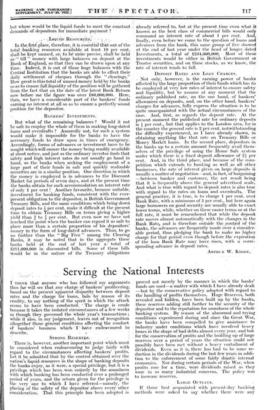STRONG, RESERVES.
There is, however, another important point which must bp considered when endeavouring to judge fairly with regard to the ..eireunistances affecting bankers' profits. Let it he. admitted that by the control obtained over the nation's liquichresources in the shape of banking deposits the banks enjoy, as it were, a special privilege, but it is a Privilege which has been . won. entirely by the soundness with which banking has been conducted over a prolonged period of years, and the return given for the -privilege is the very one •to which I have referred—namely, the placing of the safety of the depositor above every other consideration. That this principle has been adopted is proved not merely by the manner in which the banks' funds are used—a matter with which I have already dealt —but by the conservative policy adopted with regard to the handling of profits themselves. Huge Reserves, both revealed and hidden, have been built up by the banks, these reserves adding still further to the security of the depositor and to the reputation for soundness of the whole banking system. By reason of the abnormal and trying conditions experienced during and since the Great War, the banks have been compelled to give assistance to industry under conditions which have involved heavy losses in the shape of bad debts almost every year, and but for the conservation of profits and the building up of large reserves over ,a period of years the situation could not possibly have been met without a heavy curtailment of dividends. Even as it is, there has had to be some re- duction in the dividends during the last few -years in addi- tion to the enforcement of some fairly drastic internal economies. Nor during certain periods of the War, when profits rose for a time, were dividends raised as they were in so many industrial concerns. The policy was to increase reserves.














































 Previous page
Previous page